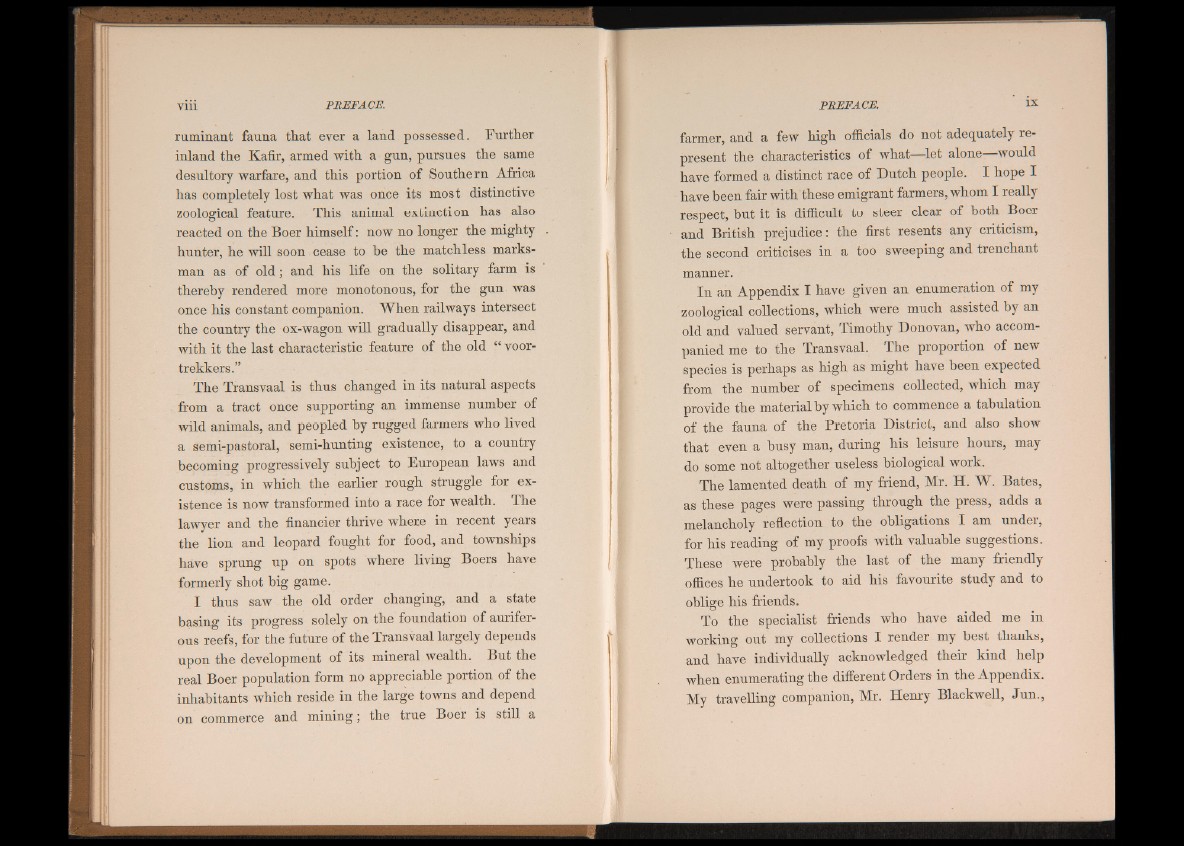
ruminant fauna that ever a land possessed. Further
inland the Kafir, armed with a gun, pursues the same
desultory warfare, and this portion of Southern Africa
has completely lost what was once its most distinctive
zoological feature. This animal extinction has also
reacted on the Boer himself: now no longer the mighty
hunter, he will soon cease to be the matchless marksman
as of old; and his life on the solitary farm is
thereby rendered more monotonous, for the gun was
once his constant companion. When railways intersect
the country the ox-wagon will gradually disappear, and
with it the last characteristic feature of the old “ voor-
trekkers.”
The Transvaal is thus changed in its natural aspects
from a tract once supporting an immense number of
wild animals, and peopled by rugged farmers who lived
a semi-pastoral, semi-hunting existence, to a country
becoming progressively subject to European laws and
customs, in which the earlier rough struggle for existence
is now transformed into a race for wealth. The
lawyer and the financier thrive where in recent years
the lion and leopard fought for food, and townships
have sprung up on spots where living Boers have
formerly shot big game.
I thus saw the old order changing, and a state
basing its progress solely on the foundation of auriferous
reefs, for the future of the Transvaal largely depends
upon the development of its mineral wealth. But the
real Boer population form no appreciable portion of the
inhabitants which reside in the large towns and depend
on commerce and mining; the true Boer is still a
farmer, and a few high officials do not adequately represent
the characteristics of what—let alone—would
have formed a distinct race of Dutch people. I hope I
have been fair with these emigrant farmers, whom I really
respect, but it is difficult to steer clear of both Boer
and British prejudice: the first resents any criticism,
the second criticises in a too sweeping and trenchant
manner.
In an Appendix I have given an enumeration of my
zoological collections, which were much assisted by an
old and valued servant, Timothy Donovan, who accompanied
me to the Transvaal. The proportion of new
species is perhaps as high as might have been expected
from the number of specimens collected, which may
provide the material by which to commence a tabulation
of the fauna of the Pretoria District, and also show
that even a busy man, during his leisure hours, may
do some not altogether useless biological work.
The lamented death of my Mend, Mr. H. W. Bates,
as these pages were passing through the press, adds a
melancholy reflection to the obligations I am under,
for his reading of my proofs with valuable suggestions.
These were probably the last of the many Mendly
offices he undertook to aid his favourite study and to
oblige his Mends.
To the specialist friends who have aided me in
working out my collections I render my best thanks,
and have individually acknowledged their kind help
when enumerating the different Orders in the Appendix.
My travelling companion, Mr. Henry Blackwell, Jun.,